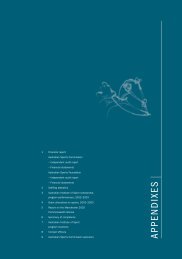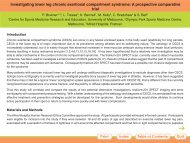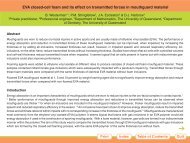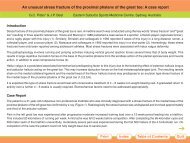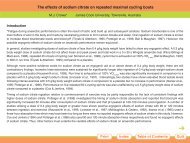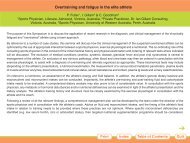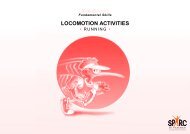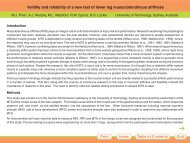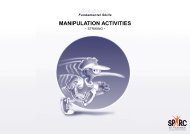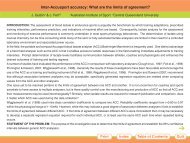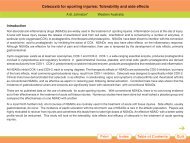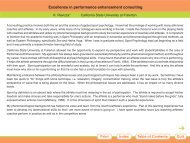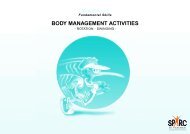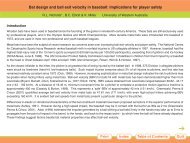2002-03 Annual R eport 2002-03 Annual R eport - Australian Sports ...
2002-03 Annual R eport 2002-03 Annual R eport - Australian Sports ...
2002-03 Annual R eport 2002-03 Annual R eport - Australian Sports ...
Create successful ePaper yourself
Turn your PDF publications into a flip-book with our unique Google optimized e-Paper software.
ELITE-LEVEL SUCCESS<br />
Top. National selectors Allan<br />
Border (left), Trevor Hohns and<br />
Andrew Hilditch (far right) with<br />
<strong>Australian</strong> Team<br />
Physiotherapist, Errol Alcott,<br />
prior to the second Orange Test<br />
in Adelaide.<br />
Middle. Simon Taufel was<br />
rewarded for his decisionmaking<br />
skills when he was<br />
appointed to the ICC’s Elite<br />
Panel of umpires.<br />
Bottom. History in the making.<br />
A drop-in wicket was installed<br />
at Darwin’s Marrara Oval as it<br />
prepared to become an<br />
international venue.<br />
In the lead-up to the decision, Cricket Australia received daily briefings from a range of advisers,<br />
including the High Commissioner in Pakistan and the Department of Foreign Affairs and Trade.<br />
The advice was combined with assessments from Cricket Australia’s own independent security<br />
experts, allowing Cricket Australia to make an informed decision about the tour.<br />
Understanding Cricket Australia’s concerns, the Pakistan Cricket Board staged the tour in the neutral<br />
venues of Kenya, Sri Lanka and the United Arab Emirates.<br />
A similar process was undertaken in the lead-up to Australia’s World Cup fixture against Zimbabwe in<br />
Bulawayo.<br />
Selection<br />
Key to the ability to foster the ongoing success of <strong>Australian</strong> teams is the work of the National<br />
Selection Panel (NSP) that is charged with the responsibility of selecting all national men’s sides at<br />
home and overseas.<br />
Led by Trevor Hohns (Chairman), the panel consists of former <strong>Australian</strong> players David Boon, Allan<br />
Border and Andrew Hilditch.<br />
Team performances in <strong>2002</strong>-<strong>03</strong> suggest the NSP again performed its task with great effect.<br />
Much of the on-field success achieved by <strong>Australian</strong> cricket over the past year, including the ICC<br />
Cricket World Cup in Southern Africa, can be credited to the work of the NSP, which began preparing a<br />
squad for the tournament following the 1999 World Cup.<br />
The selection panel for the Commonwealth Bank Southern Stars, comprising Margaret Jennings<br />
(Chairperson), Peter Bakker and Wendy Weir, contributed to the team’s fine year that resulted in both<br />
Test and one-day international success.<br />
Developing world-class umpires<br />
A nation’s cricketing strength can be assessed in the performances of its top-level players and<br />
umpires.<br />
In <strong>2002</strong>-<strong>03</strong> Cricket Australia’s umpiring unit achieved significant success, highlighted by the<br />
appointment of Darrell Hair and Simon Taufel to the ICC’s Elite Panel of Umpires.<br />
Hair and Taufel joined Daryl Harper as Australia’s ICC Elite Panel representatives and are now<br />
regularly appointed to officiate in Test matches and one-day internationals around the world.<br />
Harper’s year saw him gain selection for the World Cup semi-final between India and Kenya, the most<br />
significant fixture that he could officiate in at the tournament, given he was ineligible to umpire all<br />
<strong>Australian</strong> matches, including the World Cup final.<br />
Members of last year’s Cricket Australia National Panel, Peter Parker and Steve Davis, were also<br />
promoted, being appointed to the ICC’s International Panel.<br />
In this role, the pair can officiate in one-day internationals around the world and provide cover for the<br />
ICC Elite Panel at peak times in the international calendar.<br />
The year also saw Cricket Australia commence an initiative to attract former first-class players to<br />
umpiring.<br />
In July <strong>2002</strong> former <strong>Australian</strong> Test player Paul Reiffel and one-time Tasmanian vice-captain Rod<br />
Tucker were appointed to a Cricket Australia Project Panel, an initiative that saw the pair officiate in<br />
Cricket Australia Cup and grade-level matches throughout the summer.<br />
Reiffel and Tucker join Bruce Oxenford as the Cricket Australia-contracted umpires with first-class<br />
cricket experience. Oxenford, who is on Cricket Australia’s Supplementary Panel, played eight firstclass<br />
games for Queensland in the early 1990s.<br />
The Cricket Australia Project Panel was added to a structure that includes a six-man National Panel, a<br />
Supplementary Panel of the same number and a 12-man Development Panel. The total of 26 Cricket<br />
Australia-contracted umpires is up 18 from last year.<br />
The larger group of umpires and an enhanced support structure is designed to allow Cricket Australia<br />
to develop more officials capable of adjudicating at the highest level.<br />
Programming<br />
Under the direction of From Backyard to Baggy Green, Cricket Australia is encouraged to, where<br />
possible, be innovative and pursue programming changes that have the potential to enhance <strong>Australian</strong><br />
cricket.<br />
In <strong>2002</strong>-<strong>03</strong>, Cricket Australia was confronted with a number of challenges in planning the international<br />
and domestic program.<br />
With the <strong>Australian</strong> team required to depart for South Africa on 29 January 20<strong>03</strong> for the World Cup, the<br />
<strong>Australian</strong> season had to be condensed.<br />
This included a shift away from the traditional ‘blocked’ program of five Test matches, followed by a<br />
series of one-day internationals.<br />
16



